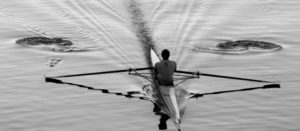In today’s post we want to show you how goal setting works for rowers. Let’s have a look what experts have to say about rowing psychology.
Chasing goals without losing sight of the enjoyment
Current sport science considers the most mentally tough rowers to have a crystal clear view of their end goal, a tangible achievement such as a specific race time or team selection. They also manage to chase their goals without losing sight of the enjoyment and love they hold for their sport, probably the aspects of rowing which motivated them to train and compete in the first place.
One of the most challenging aspects of goal setting for rowers is that it often fails to clarify the processes involved in goal setting. In order to ensure best performance (incorporating both preparation and competition), one needs to know what can be controlled, what we be influenced and what can’t be influenced. Out of all possible categories of rowing performance (for example the weather, results, or surroundings such as whether the water is flat or if there is a tailwind or headwind) Condor Performance psychologists stand by one aspect of performance being in one’s total control, and that is effort.
What’s your goal?
Helping rowers to link the destination with the journey through the process of monitoring, adjusting and ensuring optimal effort is essential for maintaining motivation and desire. To begin this process it is necessary to start with the end in mind by creating a visual map of yearly/seasonal outcome goals. For example, the first seasonal goal for a lightweight female sculler might be to record a time of 8 minutes in a 2km race by the end of the summer season.
Once an outcome goal is set, keeping track of monthly checks enable reinforcement of current effort or highlights a possible need for adjustment if there is no satisfying change in performance. Monthly checks can be a benchmark, or measurements to allow for assessment of effort and any need for change. For example, a monthly check might be recording 7 minutes for a 2km ergo time trial.
As effort is considered the controllable aspect of performance, the final aspect of ‘goal getting’ is a record of how ‘effort’ is going to be spent each week. This would include all aspects of preparing for competition, broken down into chunks – for example, 2 x 45 minute ergo sessions, 4 x 15 minute blocks of mental toughness training (specifically learning and becoming proficient at mindfulness skills for enhancing concentration during a pre-race routine), and 1 x 30 minute block of devising and revising race strategies.
For more information or questions related to goal setting or mental toughness don’t hesitate to contact us at www.condorperformance.com, or fill out our Mental Toughness Questionnaire for Athletes (MTQ-A) or Coaches (MTQ-C) and one of our qualified sport or performance psychologists will email you a summary of your current mental toughness within 48 hours.
Guestpost by Alice Williams from Condorperformance







